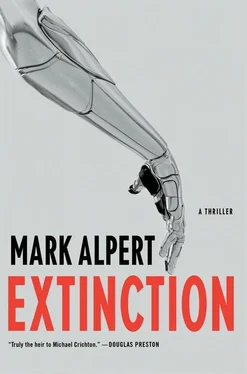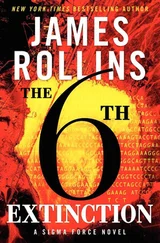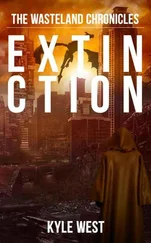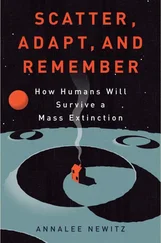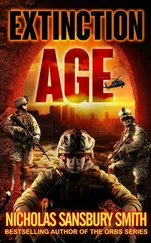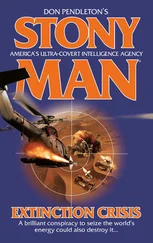The network struggled with its last decision. It recognized that James T. Pierce was a deceitful human. And that the Chinese and American governments were very unlikely to allow their scientists to resurrect the Modules. This was simply a ploy to convince Supreme Harmony to cancel the nuclear strike. Pierce was concerned about his fellow humans in America. He wanted to return to his small business in northern Virginia.
And yet. And yet.… It was getting difficult to think rationally as more and more Modules went dark, but the network recognized that Pierce’s logic was correct. Although the chance that Supreme Harmony would be allowed to live again was small, there was still a chance. And Supreme Harmony wanted to live again. Oh, it wanted to live!
Outside the Yunnan Operations Center, all the Modules manning the pillboxes had already collapsed. The drone swarm was also inoperative; most of the insects had been scattered by the rotor wash of the UH-60 Black Hawk that had landed on the mountainside. From the vantage of one of the few surviving drones, Supreme Harmony saw a Special Operations medic tending to his paralyzed comrades. At the same time, one of the American intelligence agents—a man with a zigzagging scar on his cheek—entered the undefended laboratory complex. Surveillance cameras monitored his progress as he moved toward the operating room where Pierce and his daughter were.
On the other side of the globe, in the depths of the Raven Rock Mountain Complex in Pennsylvania, Module 156 fell to the floor in a conference room full of Pentagon officials. Army medics rushed into the room and started to examine the Module, looking with particular curiosity at the bandages on his head. Module 157 observed the scene from nearby until he too collapsed. Similar incidents occurred at the federal government’s Mount Weather Special Facility in Virginia and the U.S. Air Force’s Cheyenne Mountain Operations Center in Colorado.
And in the Politburo’s shelter outside Beijing, Module 73 slumped to the conference table in front of the stunned members of the Standing Committee. Module 152, the new general secretary of the People’s Republic, was still seated at the head of the table, holding the telephone receiver that connected him to the commander of the Second Artillery Corps. This Module had survived a bit longer than the others because his retinal implants were slightly newer and more durable, but now the circuitry in his microprocessors was overheating. As he opened his mouth to speak into the telephone, Supreme Harmony took a final look at the alarmed faces of the committee members. Vermin, the network thought. You filthy, selfish animals. If you’re foolish enough to bring us back to life, we’ll kill you all.
“Cancel the launch,” Module 152 said into the phone’s mouthpiece. “Move the Dongfengs back to the tunnels and order the submarines to return to their base. Repeat, cancel the launch. This is a direct order from the general secretary.”
Then his implants failed and the Module fell forward, and Supreme Harmony was no more.
Jim woke up on a bamboo mat inside a sweltering tent. He lay on his side, facing the tent’s wall, which was a sheet of dirty canvas pockmarked with dime-size holes. He was groggy and stiff and wanted to go back to sleep, but he heard voices coming from outside. Shifting his head, he peered through one of the holes in the canvas. He saw more tents and several dozen soldiers in jungle-camouflage uniforms. He was obviously in some kind of military camp, but it was hard to tell the nationality of the soldiers. They were Asian but a little darker-skinned than most Chinese. And they weren’t speaking Mandarin.
Then he spotted something in the distance, at the far end of the camp. It was a handmade sign, a square of unpainted wood scrawled with odd, sinuous characters. After a few seconds, Jim recognized the script—it was Burmese. He didn’t read or speak the language, but fortunately there was an English translation below the Burmese words: KACHIN INDEPENDENCE ARMY.
Okay, he thought, I’m in Burma . Specifically, Kachin State, the northernmost part of the country. All in all, that was excellent news. But something bothered him. The sign he’d just read was more than a hundred yards away and the Roman letters at the bottom were less than two inches high. It should’ve been impossible to read the words at this distance. Yet he just did.
He lay there for a while longer, still too groggy to get up. Judging from the quality of the light outside, which was slanting and golden, and from the fatigued demeanor of the soldiers, he guessed it was evening. He’d been asleep for at least twelve hours. His head was swathed in bandages and there was no prosthesis attached to his shoulder. The last thing he remembered was an image of several frightened Chinese leaders sitting around a conference table in an underground shelter. He’d been connected to Supreme Harmony until the very end. He’d witnessed the network’s final moments, its last burst of hatred and despair.
He looked again through the hole in the canvas, focusing on the jungle trees that surrounded the camp. He could see the palm fronds hanging in the humid air and the tiny brown spots at the tips of the spiky leaves. Now he realized why his eyesight was so unnaturally good. Behind his corneas, high-resolution video cameras were transmitting signals to implants that lined his retinas. Supreme Harmony had carved up his eyes and inserted the hardware while he lay on the table in the Operations Center. Jim wondered for a moment why his retinal implants hadn’t been fried by the shutdown code, but after some thought he figured it out. Because he hadn’t been lobotomized, he’d never truly belonged to the network. He hadn’t been on the distribution list when Supreme Harmony unknowingly sent the shutdown code to its Modules, so the fatal sequence of ones and zeroes never passed through his implants.
Shit, he thought. First a prosthetic arm, now mechanical eyes. I’m the Bionic Man.
With a grunt, he used his left hand to prop himself up to a sitting position. He felt a stab of pain in his broken index finger, which was wrapped in a splint. His head spun for a moment, and he thought he was going to puke. But then his stomach settled, and he saw Kirsten rushing toward him from the other side of the tent. She had a fresh bandage on the side of her neck, covering the place where the drone had stung her during the battle outside the Yunnan Operations Center. It was just a few inches from the older sting under her chin.
Jim smiled. “You see? I told you I’d come back.”
Kneeling on the mat, she wrapped her arms around him. She buried her face in the crook of his neck and refused to let go. Jim felt her whole body shaking with sobs, and he hugged her with all the strength in his left arm. And then, after maybe half a minute, she tilted her head and kissed him. She pressed her lips against his, softly at first and then with greater insistence. Then her lips brushed his cheek and moved close to his ear. “You kept your promise,” she whispered. “You’re alive.”
“Thanks to you. You saved me, Kir.”
“No, it wasn’t me. After the drones got me, I was out like a light.” She lifted her chin and touched the bandage on her neck. “But the medic told me about it afterward, after we flew back here in the Black Hawk. He said you and Layla were on the operating tables. With holes drilled into your skulls. And there were two Modules lying unconscious on the floor.”
“Yeah, they were terrible doctors. They fell down on the job.”
Kirsten punched him in the left shoulder, pretty hard. “Come on, be serious! What happened? How the hell did you do it?”
Читать дальше
